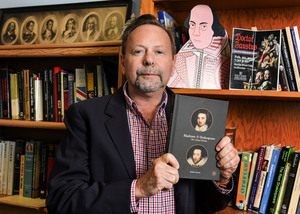

Dr. Robert Sawyer
JOHNSON CITY – They were born in the same year, 1564. And their reputations have been intertwined ever since. English playwrights Christopher Marlowe and William Shakespeare are now the subjects of a new book, written by East Tennessee State University professor Dr. Robert Sawyer.
"Marlowe and Shakespeare: The Critical Rivalry" examines how literary critics, dramatists, novelists and film directors have viewed the relationship between the works of the two giants of British literature, going back over 400 years.
"More than a biography, Robert Sawyer's book gives us a sweeping history of four centuries of the critical and theatrical reception of these two intertwined geniuses, both of them products of the 16th-century educational and religious revolution, who shared stages, printers, publishers, and the expanding international port city of London," writes Terri Bourus, general editor of "The New Oxford Shakespeare." "They are "rivals' only in the sense that my left eye rivals my right eye: they work together to offer a stereoscopic view of the world."
The book begins with the comments of Elizabethan dramatist Robert Greene from 1592 and ends with the post-9/11 era and how the resulting climate of conspiracy theories has affected critical opinion of Marlowe and Shakespeare, including the belief, among some, that Marlowe was Shakespeare's ghost writer. Katherine Scheil of the University of Minnesota calls Sawyer's work "original and ground-breaking."
Sawyer discounts the notion that Marlowe wrote Shakespeare's plays but points out that they likely crossed paths in the London theater world. Their backgrounds, though, as Sawyer says, were decidedly different. Marlowe became known as one of the University Wits at Cambridge, whereas Shakespeare was largely self educated. Before his death 23 years before Shakespeare's, Marlowe produced six plays. Shakespeare wrote more than 30.
"This book does not focus on the two as writers," Sawyer says. "Instead, it does something no one else has ever done by looking at them in tandem through the eyes of critics, novelists, poets and filmmakers down through the ages."
In the book, which was a four-year project, Sawyer explores how the feminist movement, Marxism and the Cold War have all affected critics' views of the works of the two playwrights.
"And, in most books, Marlowe's name never comes first," Sawyer adds. "In mine, it does."
"Marlowe and Shakespeare" also reveals how the two have figured into other artists' works, such as the novels of Anthony Burgess, author of "A Clockwork Orange," and the 1998 American film "Shakespeare in Love," written by Marc Norman and Tom Stoppard. According to John Drakakis at Scotland's University of Stirling, "Sawyer deftly charts the increasing interaction between literary and popular culture."
Sawyer was supported in his work by a grant from the ETSU Research Development Committee, which helped fund travel to the Folger Shakespeare Library in Washington, D.C.
"Marlowe and Shakespeare: The Critical Rivalry" is published by Palgrave Macmillan.